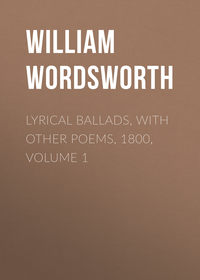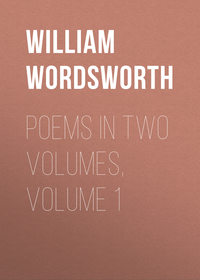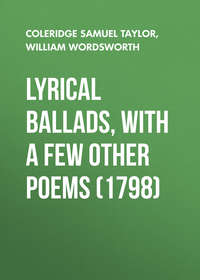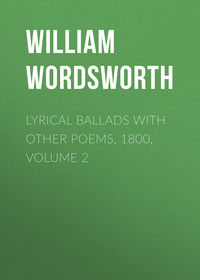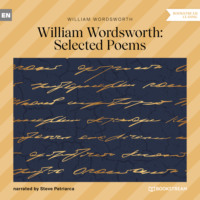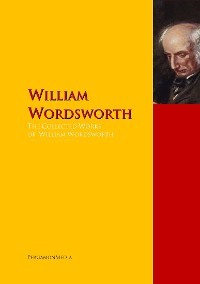Poems in Two Volumes, Volume 2
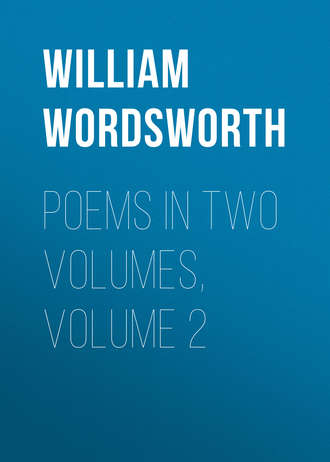 полная версия
полная версияPoems in Two Volumes, Volume 2
Жанр: зарубежная поэзиязарубежная классикастихи и поэзиялитература 19 векалитература 18 векасерьезное чтениеcтихи, поэзия
Язык: Английский
Год издания: 2017
Добавлена:
Настройки чтения
Размер шрифта
Высота строк
Поля

William Wordsworth
Poems in Two Volumes, Volume 2
POEMS WRITTEN DURING A TOUR IN SCOTLAND
1. ROB ROY's GRAVE
The History of Rob Roy is sufficiently known; his Grave is near the head of Loch Ketterine, in one of those small Pin-fold-like Burial-grounds, of neglected and desolate appearance, which the Traveller meets with in the Highlands of Scotland A famous Man is Robin Hood, The English Ballad-singer's joy! And Scotland has a Thief as good, An Outlaw of as daring mood, She has her brave ROB ROY! Then clear the weeds from off his Grave, And let us chaunt a passing Stave In honour of that Hero brave! Heaven gave Rob Roy a dauntless heart, And wondrous length and strength of arm: Nor craved he more to quell his Foes, Or keep his Friends from harm. Yet was Rob Roy as wise as brave; Forgive me if the phrase be strong; — Poet worthy of Rob Roy Must scorn a timid song. Say, then, that he was wise as brave; As wise in thought as bold in deed: For in the principles of things He sought his moral creed. Said generous Rob, "What need of Books? Burn all the Statutes and their shelves: They stir us up against our Kind; And worse, against Ourselves." "We have a passion, make a law, Too false to guide us or controul! And for the law itself we fight In bitterness of soul." "And, puzzled, blinded thus, we lose Distinctions that are plain and few: These find I graven on my heart: That tells me what to do." "The Creatures see of flood and field, And those that travel on the wind! With them no strife can last; they live In peace, and peace of mind." "For why? – because the good old Rule Sufficeth them, the simple Plan, That they should take who have the power, And they should keep who can." "A lesson which is quickly learn'd, A signal this which all can see! Thus nothing here provokes the Strong To wanton cruelty." "All freakishness of mind is check'd; He tam'd, who foolishly aspires; While to the measure of his might Each fashions his desires." "All Kinds, and Creatures, stand and fall By strength of prowess or of wit: Tis God's appointment who must sway, And who is to submit." "Since then," said Robin, "right is plain, And longest life is but a day; To have my ends, maintain my rights, I'll take the shortest way." And thus among these rocks he liv'd, Through summer's heat and winter's snow: The Eagle, he was Lord above, And Rob was Lord below. So was it —would, at least, have been But through untowardness of fate: For Polity was then too strong; He came an age too late, Or shall we say an age too soon? For, were the bold Man living now, How might he flourish in his pride, With buds on every bough! Then rents and Factors, rights of chace, Sheriffs, and Lairds and their domains Would all have seem'd but paltry things, Not worth a moment's pains. Rob Roy had never linger'd here, To these few meagre Vales confin'd; But thought how wide the world, the times How fairly to his mind! And to his Sword he would have said, "Do Thou my sovereign will enact From land to land through half the earth! Judge thou of law and fact!" "Tis fit that we should do our part; Becoming, that mankind should learn That we are not to be surpass'd In fatherly concern." "Of old things all are over old, Of good things none are good enough: — We'll shew that we can help to frame A world of other stuff." "I, too, will have my Kings that take From me the sign of life and death: Kingdoms shall shift about, like clouds, Obedient to my breath." And, if the word had been fulfill'd, As might have been, then, thought of joy! France would have had her present Boast; And we our brave Rob Roy! Oh! say not so; compare them not; I would not wrong thee, Champion brave! Would wrong thee no where; least of all Here standing by thy Grave. For Thou, although with some wild thoughts, Wild Chieftain of a Savage Clan! Hadst this to boast of; thou didst love The liberty of Man. And, had it been thy lot to live With us who now behold the light, Thou would'st have nobly stirr'd thyself, And battled for the Right. For Robin was the poor Man's stay The poor man's heart, the poor man's hand; And all the oppress'd, who wanted strength, Had Robin's to command. Bear witness many a pensive sigh Of thoughtful Herdsman when he strays Alone upon Loch Veol's Heights, And by Loch Lomond's Braes! And, far and near, through vale and hill, Are faces that attest the same; And kindle, like a fire new stirr'd, At sound of ROB ROY's name. 12. THE SOLITARY REAPER
Behold her, single in the field, Yon solitary Highland Lass! Reaping and singing by herself; Stop here, or gently pass! Alone she cuts, and binds the grain, And sings a melancholy strain; O listen! for the Vale profound Is overflowing with the sound. No Nightingale did ever chaunt So sweetly to reposing bands Of Travellers in some shady haunt, Among Arabian Sands: No sweeter voice was ever heard In spring-time from the Cuckoo-bird, Breaking the silence of the seas Among the farthest Hebrides. Will no one tell me what she sings? Perhaps the plaintive numbers flow For old, unhappy, far-off things, And battles long ago: Or is it some more humble lay, Familiar matter of today? Some natural sorrow, loss, or pain, That has been, and may be again! Whate'er the theme, the Maiden sung As if her song could have no ending; I saw her singing at her work, And o'er the sickle bending; I listen'd till I had my fill; And, as I mounted up the hill, The music in my heart I bore, Long after it was heard no more.3. STEPPING WESTWARD
While my Fellow-traveller and I were walking by the side of Loch Ketterine, one fine evening after sun-set, in our road to a Hut where in the course of our Tour we had been hospitably entertained some weeks before, we met, in one of the loneliest parts of that solitary region, two well dressed Women, one of whom said to us, by way of greeting, "What you are stepping westward?" "What you are stepping westward?" – "Yea." – 'Twould be a wildish destiny, If we, who thus together roam In a strange Land, and far from home, Were in this place the guests of Chance: Yet who would stop, or fear to advance, Though home or shelter he had none, With such a Sky to lead him on? The dewy ground was dark and cold; Behind, all gloomy to behold; And stepping westward seem'd to be A kind of heavenly destiny; I liked the greeting; 'twas a sound Of something without place or bound; And seem'd to give me spiritual right To travel through that region bright. The voice was soft, and she who spake Was walking by her native Lake: The salutation had to me The very sound of courtesy: It's power was felt; and while my eye Was fixed upon the glowing sky, The echo of the voice enwrought A human sweetness with the thought Of travelling through the world that lay Before me in my endless way.4. GLEN-ALMAIN
or the NARROW GLEN
In this still place, remote from men, Sleeps Ossian, in the NARROW GLEN; In this still place, where murmurs on But one meek Streamlet, only one: He sang of battles, and the breath Of stormy war, and violent death; And should, methinks, when all was past, Have rightfully been laid at last Where rocks were sudely heap'd, and rent As by a spirit turbulent; Where sights were rough, and sounds were wild, And every thing unreconciled; In some complaining, dim retreat, For fear and melancholy meet; But this is calm; there cannot be A more entire tranquillity. Does then the Bard sleep here indeed? Or is it but a groundless creed? What matters it? I blame them not Whose Fancy in this lonely Spot Was moved; and in this way express'd Their notion of it's perfect rest. A Convent, even a hermit's Cell Would break the silence of this Dell: It is not quiet, is not ease; But something deeper far than these: The separation that is here Is of the grave; and of austere And happy feelings of the dead: And, therefore, was it rightly said That Ossian, last of all his race! Lies buried in this lonely place.5. THE MATRON OF JEDBOROUGH AND HER HUSBAND
At Jedborough we went into private Lodgings for a few days; and the following Verses were called forth by the character, and domestic situation, of our Hostess Age! twine thy brows with fresh spring flowers! And call a train of laughing Hours; And bid them dance, and bid them sing; And Thou, too, mingle in the Ring! Take to thy heart a new delight; If not, make merry in despite! For there is one who scorns thy power. – But dance! for under Jedborough Tower There liveth in the prime of glee, A Woman, whose years are seventy-three, And She will dance and sing with thee! Nay! start not at that Figure – there! Him who is rooted to his chair! Look at him – look again! for He Hath long been of thy Family. With legs that move not, if they can, And useless arms, a Trunk of Man, He sits, and with a vacant eye; A Sight to make a Stranger sigh! Deaf, drooping, that is now his doom: His world is in this single room: Is this a place for mirth and cheer? Can merry-making enter here? The joyous Woman is the Mate Of Him in that forlorn estate! He breathes a subterraneous damp, But bright as Vesper shines her lamp: He is as mute as Jedborough Tower; She jocund as it was of yore, With all it's bravery on; in times, When, all alive with merry chimes, Upon a sun-bright morn of May, It rouz'd the Vale to Holiday. I praise thee, Matron! and thy due Is praise; heroic praise, and true! With admiration I behold Thy gladness unsubdued and bold: Thy looks, thy gestures, all present The picture of a life well-spent: This do I see; and something more; A strength unthought of heretofore! Delighted am I for thy sake; And yet a higher joy partake. Our Human-nature throws away It's second Twilight, and looks gay: A Land of promise and of pride Unfolding, wide as life is wide. Ah! see her helpless Charge! enclos'd Within himself, as seems; compos'd; To fear of loss, and hope of gain, The strife of happiness and pain, Utterly dead! yet, in the guise Of little Infants, when their eyes Begin to follow to and fro The persons that before them go, He tracks her motions, quick or slow. Her buoyant Spirit can prevail Where common cheerfulness would fail: She strikes upon him with the heat Of July Suns; he feels it sweet; An animal delight though dim! 'Tis all that now remains for him! I look'd, I scann'd her o'er and o'er; The more I look'd I wonder'd more: When suddenly I seem'd to espy A trouble in her strong black eye; A remnant of uneasy light, A flash of something over-bright! And soon she made this matter plain; And told me, in a thoughtful strain, That she had borne a heavy yoke, Been stricken by a twofold stroke; Ill health of body; and had pin'd Beneath worse ailments of the mind. So be it! but let praise ascend To Him who is our Lord and Friend! Who from disease and suffering Hath call'd for thee a second Spring; Repaid thee for that sore distress By no untimely joyousness; Which makes of thine a blissful state; And cheers thy melancholy Mate!6. TO A HIGHLAND GIRL
(At Inversneyde, upon Loch Lomond.) Sweet Highland Girl, a very shower Of beauty is thy earthly dower! Twice seven consenting years have shed Their utmost bounty on thy head: And these gray Rocks; this household Lawn; These Trees, a veil just half withdrawn; This fall of water, that doth make A murmur near the silent Lake; This little Bay, a quiet Road That holds in shelter thy Abode; In truth together ye do seem Like something fashion'd in a dream; Such Forms as from their covert peep When earthly cares are laid asleep! Yet, dream and vision as thou art, I bless thee with a human heart: God shield thee to thy latest years! I neither know thee nor thy peers; And yet my eyes are fill'd with tears. With earnest feeling I shall pray For thee when I am far away: For never saw I mien, or face, In which more plainly I could trace Benignity and home-bred sense Ripening in perfect innocence. Here, scatter'd like a random seed, Remote from men, Thou dost not need The embarrass'd look of shy distress, And maidenly shamefacedness: Thou wear'st upon thy forehead clear The freedom of a Mountaineer. A face with gladness overspread! Sweet looks, by human kindness bred! And seemliness complete, that sways Thy courtesies, about thee plays; With no restraint, but such as springs From quick and eager visitings Of thoughts, that lie beyond the reach Of thy few words of English speech: A bondage sweetly brook'd, a strife That gives thy gestures grace and life! So have I, not unmov'd in mind, Seen birds of tempest-loving kind, Thus beating up against the wind. What hand but would a garland cull For thee who art so beautiful? O happy pleasure! here to dwell Beside thee in some heathy dell; Adopt your homely ways and dress, A Shepherd, thou a Shepherdess! But I could frame a wish for thee More like a grave reality: Thou art to me but as a wave Of the wild sea; and I would have Some claim upon thee, if I could, Though but of common neighbourhood. What joy to hear thee, and to see! Thy elder Brother I would be, Thy Father, any thing to thee! Now thanks to Heaven! that of its grace Hath led me to this lonely place. Joy have I had; and going hence I bear away my recompence. In spots like these it is we prize Our Memory, feel that she hath eyes: Then, why should I be loth to stir? I feel this place was made for her; To give new pleasure like the past, Continued long as life shall last. Nor am I loth, though pleased at heart, Sweet Highland Girl! from Thee to part; For I, methinks, till I grow old, As fair before me shall behold, As I do now, the Cabin small, The Lake, the Bay, the Waterfall; And Thee, the Spirit of them all!7. SONNET
(Composed at – Castle.) Degenerate Douglas! oh, the unworthy Lord! Whom mere despite of heart could so far please, And love of havoc (for with such disease Fame taxes him) that he could send forth word To level with the dust a noble horde, A brotherhood of venerable Trees, Leaving an ancient Dome, and Towers like these, Beggared and outraged! – Many hearts deplor'd The fate of those old Trees; and oft with pain The Traveller, at this day, will stop and gaze On wrongs, which Nature scarcely seems to heed: For shelter'd places, bosoms, nooks and bays, And the pure mountains, and the gentle Tweed, And the green silent pastures, yet remain.8. ADDRESS TO THE SONS OF BURNS
after visiting their Father's Grave (August 14th, 1803.) Ye now are panting up life's hill! 'Tis twilight time of good and ill, And more than common strength and skill Must ye display If ye would give the better will Its lawful sway. Strong bodied if ye be to bear Intemperance with less harm, beware! But if your Father's wit ye share, Then, then indeed, Ye Sons of Burns! for watchful care There will be need. For honest men delight will take To shew you favor for his sake, Will flatter you; and Fool and Rake Your steps pursue: And of your Father's name will make A snare for you. Let no mean hope your souls enslave; Be independent, generous, brave! Your Father such example gave, And such revere! But be admonish'd by his Grave, And think, and fear!9. YARROW UNVISITED
(See the various Poems the scene of which is laid upon theBanks of the Yarrow; in particular, the exquisite Balladof Hamilton, beginning:"Busk ye, busk ye my bonny, bonny Bride,Busk ye, busk ye my winsome Marrow!" – ) From Stirling Castle we had seen The mazy Forth unravell'd; Had trod the banks of Clyde, and Tay, And with the Tweed had travell'd; And, when we came to Clovenford, Then said my 'winsome Marrow', "Whate'er betide, we'll turn aside, And see the Braes of Yarrow." "Let Yarrow Folk, frae Selkirk Town, Who have been buying, selling, Go back to Yarrow, 'tis their own, Each Maiden to her Dwelling! On Yarrow's Banks let herons feed, Hares couch, and rabbits burrow! But we will downwards with the Tweed, Nor turn aside to Yarrow." "There's Galla Water, Leader Haughs, Both lying right before us; And Dryborough, where with chiming Tweed The Lintwhites sing in chorus; There's pleasant Tiviot Dale, a land Made blithe with plough and harrow; Why throw away a needful day To go in search of Yarrow?" "What's Yarrow but a River bare That glides the dark hills under? There are a thousand such elsewhere As worthy of your wonder." – Strange words they seem'd of slight and scorn; My True-love sigh'd for sorrow; And look'd me in the face, to think I thus could speak of Yarrow! "Oh! green," said I, "are Yarrow's Holms, And sweet is Yarrow flowing! Fair hangs the apple frae the rock1, But we will leave it growing. O'er hilly path, and open Strath, We'll wander Scotland thorough; But, though so near, we will not turn Into the Dale of Yarrow." "Let Beeves and home-bred Kine partake The sweets of Burn-mill meadow; The Swan on still St. Mary's Lake Float double, Swan and Shadow! We will not see them; will not go, Today, nor yet tomorrow; Enough if in our hearts we know, There's such a place as Yarrow." "Be Yarrow Stream unseen, unknown! It must, or we shall rue it: We have a vision of our own; Ah! why should we undo it? The treasured dreams of times long past We'll keep them, winsome Marrow! For when we're there although 'tis fair 'Twill be another Yarrow!" "If Care with freezing years should come, And wandering seem but folly, Should we be loth to stir from home, And yet be melancholy; Should life be dull, and spirits low, 'Twill soothe us in our sorrow That earth has something yet to show, The bonny Holms of Yarrow!"MOODS OF MY OWN MIND
1. TO A BUTTERFLY
Stay near me – do not take thy flight! A little longer stay in sight! Much converse do I find in Thee, Historian of my Infancy! Float near me; do not yet depart! Dead times revive in thee: Thou bring'st, gay Creature as thou art! A solemn image to my heart, My Father's Family! Oh! pleasant, pleasant were the days, The time, when in our childish plays My sister Emmeline and I Together chaced the Butterfly! A very hunter did I rush Upon the prey: – with leaps and springs I follow'd on from brake to bush; But She, God love her! feared to brush The dust from off its wings.2 The Sun has long been set: The Stars are out by twos and threes; The little Birds are piping yet Among the bushes and trees; There's a Cuckoo, and one or two thrushes; And a noise of wind that rushes, With a noise of water that gushes; And the Cuckoo's sovereign cry Fills all the hollow of the sky! Who would go "parading" In London, and "masquerading," On such a night of June? With that beautiful soft half-moon, And all these innocent blisses, On such a night as this is!3 O Nightingale! thou surely art A Creature of a fiery heart — These notes of thine they pierce, and pierce; Tumultuous harmony and fierce! Thou sing'st as if the God of wine Had help'd thee to a Valentine; A song in mockery and despite Of shades, and dews, and silent Night, And steady bliss, and all the Loves Now sleeping in these peaceful groves! I heard a Stockdove sing or say His homely tale, this very day. His voice was buried among trees, Yet to be come at by the breeze: He did not cease; but coo'd – and coo'd; And somewhat pensively he woo'd: He sang of love with quiet blending, Slow to begin, and never ending; Of serious faith, and inward glee; That was the Song, the Song for me!4 My heart leaps up when I behold A Rainbow in the sky: So was it when my life began; So is it now I am a Man; So be it when I shall grow old, Or let me die! The Child is Father of the Man; And I could wish my days to be Bound each to each by natural piety.5. WRITTEN IN MARCH,While resting on the Bridge at the Foot of Brother's Water The cook is crowing, The stream is flowing, The small birds twitter, The lake doth glitter, The green field sleeps in the sun; The oldest and youngest Are at work with the strongest; The cattle are grazing, Their heads never raising; There are forty feeding like one! Like an army defeated The Snow hath retreated, And now doth fare ill On the top of the bare hill; The Plough-boy is whooping – anon – anon: There's joy in the mountains; There's life in the fountains; Small clouds are sailing, Blue sky prevailing; The rain is over and gone!6. THE SMALL CELANDINECommon Pilewort There is a Flower, the Lesser Celandine, That shrinks, like many more, from cold and rain; And, the first moment that the sun may shine, Bright as the sun itself, 'tis out again! When hailstones have been falling swarm on swarm, Or blasts the green field and the trees distress'd, Oft have I seen it muffled up from harm, In close self-shelter, like a Thing at rest. But lately, one rough day, this Flower I pass'd, And recognized it, though an alter'd Form, Now standing forth an offering to the Blast, And buffetted at will by Rain and Storm, I stopp'd, and said with inly muttered voice, "It doth not love the shower, nor seek the cold: This neither is it's courage nor it's choice, But it's necessity in being old." The sunshine may not bless it, nor the dew; It cannot help itself in it's decay; Stiff in it's members, wither'd, changed of hue. And, in my spleen, I smiled that it was grey. To be a Prodigal's Favorite – then, worse truth, A Miser's Pensioner – behold our lot! O Man! that from thy fair and shining youth Age might but take the things Youth needed not!7 I wandered lonely as a Cloud That floats on high o'er Vales and Hills, When all at once I saw a crowd A host of dancing Daffodills; Along the Lake, beneath the trees, Ten thousand dancing in the breeze. The waves beside them danced, but they Outdid the sparkling waves in glee: — A Poet could not but be gay In such a laughing company: I gaz'd – and gaz'd – but little thought What wealth the shew to me had brought: For oft when on my couch I lie In vacant or in pensive mood, They flash upon that inward eye Which is the bliss of solitude, And then my heart with pleasure fills, And dances with the Daffodils.8 Who fancied what a pretty sight This Rock would be if edged around With living Snowdrops? circlet bright! How glorious to this Orchard ground! Who loved the little Rock, and set Upon its Head this Coronet? Was it the humour of a Child? Or rather of some love-sick Maid, Whose brows, the day that she was styled The Shepherd Queen, were thus arrayed? Of Man mature, or Matron sage? Or old Man toying with his age? I ask'd – 'twas whisper'd, The device To each or all might well belong. It is the Spirit of Paradise That prompts such work, a Spirit strong, That gives to all the self-same bent Where life is wise and innocent.9. THE SPARROW'S NEST
Look, five blue eggs are gleaming there! Few visions have I seen more fair, Nor many prospects of delight More pleasing than that simple sight! I started seeming to espy The home and shelter'd bed, The Sparrow's dwelling, which, hard by My Father's House, in wet or dry, My Sister Emmeline and I Together visited. She look'd at it as if she fear'd it; Still wishing, dreading to be near it: Such heart was in her, being then A little Prattler among men. The Blessing of my later years Was with me when a Boy; She gave me eyes, she gave me ears; And humble cares, and delicate fears; A heart, the fountain of sweet tears; And love, and thought, and joy.10. GIPSIES
Yet are they here? – the same unbroken knot Of human Beings, in the self-same spot! Men, Women, Children, yea the frame Of the whole Spectacle the same! Only their fire seems bolder, yielding light: Now deep and red, the colouring of night; That on their Gipsy-faces falls, Their bed of straw and blanket-walls. – Twelve hours, twelve bounteous hours, are gone while I Have been a Traveller under open sky, Much witnessing of change and chear, Yet as I left I find them here! The weary Sun betook himself to rest. – Then issued Vesper from the fulgent West, Outshining like a visible God The glorious path in which he trod. And now, ascending, after one dark hour, And one night's diminution of her power, Behold the mighty Moon! this way She looks as if at them – but they Regard not her: – oh better wrong and strife, Better vain deeds or evil than such life! The silent Heavens have goings on; The stars have tasks – but these have none.

